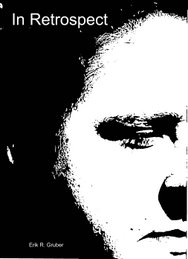Yesterday I established that I have some serious issues believing in the inerrancy of the Bible. But what does that mean? How does this affect my faith, my world view, my perception of existence and our relationship to a higher realm?
Theologians have proposed another way around the issue. There is a school of thought that believes the Bible is infallible and holds that the Book is inerrant on issues of faith and practice but not on issues of science and history. Does that mean God can make mistakes? That He didn’t understand the scientific workings of the universe which he created? That He was unable to divinely inspire his authors to get the historical facts straight?
If you ask me, this is blasphemy. One could argue that man’s misconceptions about history and science are at fault. True, the men who wrote the Bible didn’t have the understanding or technological advancements that we enjoy now, but think about what this argument is really saying. It’s saying that these men were incapable of understanding the science and history of the world around them, and should not be expected to have such a capacity, yet they were able to, without error, decipher the Divine Mystery. They were able to comprehend the Nature and Will of God, fathom the unfathomable vastness that is the Creator of the Universe, and envision God’s Kingdom as He would see fit. I doubt it. This theory doesn’t give God the credit He deserves. It is arguing that the complexities of earthbound affairs are more difficult to grasp than the infinite complexities of its Creator. Not an assertion I’d be willing to make.
Then again, maybe I’m the blasphemer.
Since I have such difficulty accepting the nature of the Bible as inerrant, and since I find the theory of infallibility to be an implausible detour, I guess I have just one question left to ask myself: Does it matter?
Can I call myself a Christian and question the Bible as much as I do? That’s a difficult query, and I’ll answer it by saying: no with a maybe and yes with a but…
If I were to define Christianity as a “religion” in the traditional sense of the word, then my skepticism and my Christianity would most likely be incompatible. Christianity as a formal religion is heavily steeped in doctrine drawn from the Bible and leaves little room for questioning.
So it’s lucky (convenient?) for me that I don’t define Christianity as the church. My quandaries with Biblical inerrancy don’t necessarily inhibit my ability to shape my life as a man of God. I don’t doubt the existence of God, nor do I doubt His awesome power, boundless nature, or infinite graciousness. I believe the Bible is a valuable teaching tool that ought to be used as a guide to morality and righteousness. I believe we should all strive to model our lives after the life of Jesus and uphold his appeals to care for the “least of these.”
But do I accept the Bible at face value, as the absolute Word of God? I don’t know anymore…
Maybe I just lack the courage required of true faith.
Thanks for reading.
P.S. Thanks to all for their comments on the “Is the Bible Inerrant?” post. As always, they were insightful and have helped me immensely in the gestation process.
Drew-bee, I’ve gotta say I’m envious of your faithfulness. It’s not always easy to believe.
P Corcs and Late Night Cassel, I think you two represent counterpoints that, intentionally or not, demonstrate interesting dichotomies on the issue of Biblical inerrancy. P Corcs, you take the all or nothing approach. Either A) the Bible is the divine, inspired Word of God, in which case it must (by definition) be inerrant, or B) the Bible is a religious work created by man, in which case it is subject to error.
Your justification for the either/or approach is strong, and admittedly a little scary. If we took the stance that some of the Bible is inspired and some isn’t it would be easy to pick and choose which parts we followed and which parts we ignored. Such a stance holds some potentially ghastly consequences.
But I think Late Night Cassel has proposed a third option in his “Bible as metanarrative” interpretation. Perhaps the Bible is a divinely inspired story, designed to give us a glimpse of the nature of God, to give us the experience of resurrection, to show us that throughout history God has been at the side of His Creation without fail. So while the specific text may not be inerrant, the story is.
Or maybe we’re all way off and God is laughing at us as we type.
Subscribe to:
Post Comments (Atom)


















13 comments:
I liked the closure to the post. Everybody brought up some good points. I like how Pat said in his last comment "Would have God have let the Bible contain some false teachings or errant text?" I don't think he would lead us astray like that.
Does it really matter? Am I going to question whether parts of the Bible are true or not? No, I have been taught to live by the Bible and I believe it IS the word of God and I am going to live for Christ. I believe in what is says and I will go to heaven for having Christ as my personal Lord and Savior. If we are all way off, oh well. There isn't another life I would like to live, this one gives me hope along with the B-I-B-L-E.
I am anxious for other comments.
First comments, and on a tricky topic... I would tend to agree that dominant group of Christians look at the bible as never being wrong. But the more important issue is the fact that they assume their indiv views is infallible. When in fact this is a direct contradiction to what the bible teaches. Each individual is suppose to read the bible in interpret it for their own life. They are suppose to have a personal, and unique relationship with god, and the bible for that fact. Look at the book of Judah just recently found, and he writes how he sees god differently, and how god teaches him different then any of the other apostles. It is absurd to say that we now the right and wrong ways to have faith, since faith is just that faith. To ever try to lay doubt in any one else faith, is to cross the lines of your very own faith. In fact when others want to press there views and opinions so hard on others, it makes me think they question their faith and are looking for support to help their subconsciousness. For the man with real faith will never need another man to justify his beliefs. And there are far to many Christians who forget to follow the teaching of Jesus Christ. His teaching where to love everyone, and not to judge. We seem to have gotten of this path, and on to one of war, hate, crimes, and prsecution. Instead of the teaching of peace, love, understanding and caring. I know I sound like a hippie, but what Christian wouldn’t agree with these principles. Would jesus dwell on minor details, or would faith and love be good enough.. For any one to think they have the right to make that decision, I ask them who gave them that right. And why would you want to persecute some one to hell, that does not seem like a quality Jesus would support. So I guess all I really needed to say is truth is a perception, on that strongly depends on many factors. The time you live in, the place you live in, your social status, your ability to think”just a few”. And the truth is not constant, and never will be, it is only a perception one that never can be defined by words. And “the only man that knows anything, is the man that knows he knows nothing” Socrates. We need to stop putting so much weight on religion, it has not gotten us far “wars and killing since Alexander the so called “great”decided to make Christianity the “right” choice and killed thousands of jews. We need to put our faith and people, and spirituality...no matter what that might be. I think if you asked Jesus faith would be enough. Look at gruber, stand up guy yet you question if you have enough faith to be religious man. I think the question is do you have enough faith to not be a constucted religious man. But instead to have true faith, and creat your own path to jesues/spirtuality. Jesus Christ was not created by man, but the religion to follow was. And ever thing created by man is flawed, and will some day be replaced.. And from a logic point of view, if you run the the standard test"did it in logic class" the bible would come up as falsity. Gruber, was right when he said we cant just say it is true, that called a cirruclar justifaction, or a starw man argument, you chose. And i dont know who drew-bee is and i dont mean toOffend, but just because we are taught something does not make it right. We where taught racism, sexism and now realgism “just made up a word” Just beleving what others say is a slippry slope, one i dont want to go down....
I made another comment this morning on the last post from Gruber and I don't know if anyone read it or not but to reiterate...
I like what the Cassel Dassel and Gruber are saying but for me it doesn't answer the question of how to live. I know I am not capable of making my own path on how to live because I will do it wrong.
I definately do not want to trust another man to tell me how to live. (whether it is a man living today or a man 2000 years ago that would have written the Bible uninspired).
That is why my only conclusion is that the Bible has to be the inerrant inspired word of God. Because I do not believe the loving caring God that i have sought after would leave stupid me to do life without a guideline. And i sure do not believe he would leave me with a guideline that might/might not be right.
PS. Who is Socrates08? If you read this Socrates could you try to write in paragraphs, it would just make it easier for me to follow. I feel like you had a lot of good things to say but they got all mushed in my head.
pat- i think even with out the bible God gave you guidlines. you know in your heart how to be a good person. the knowldge in your heart or head is suppose to be the best knowldge you can have, and the only things you can trust. I dont think you would be any less of a great person with out the bible. and God does have a path, but maybe that path is to quesion the bible, who are me to say?
ps- sorry about no paragraphs, 1st timer..
Socrates, quit playing games with my head, who are you?
To respond, if we know in our heads how to live, how come there are so many different ways that people say we should live? How come so many people have different ideas of what is right and wrong.
I know who you are socrates, you are Trigger. What is up brother man. Welcome to conversation.
I have a guess. Socrates08=Trigger.
Sorry gruber, i won.
I like you people.
shh dont tell.....i think the key is to live it let be. thats why i quoted socrates "the only man that knows anything, is the man that knows nothing. not that we shouldnt belive, but we need to know they are, our belifs. And their is no problem with any belifs, as long as they dont hurt others, or judge other belifs.and your right, so many people think they have it right. Instead of seeing what is right for them and being focused on that, they should see it might be wrong for some one else, their truth might be diff but still might be right. what is truely right, would be a faith and truh that has room for all faiths and all truths.. truth is only a percption...i love you pat
the quote is- the only man that knows anything is the man that knows he knows nothing...and i love you to gruber
I love the dialoguing! I would like to respond to F.R.O.T.M. (former reader of the month) P Corcs' comment "I like what the Cassel Dassel and Gruber are saying but for me it doesn't answer the question of how to live. I know I am not capable of making my own path on how to live because I will do it wrong."
The point of my stance is just that...taking the biblical texts as metanarative is for the purpose to gain a big picture of Christianity (and Judaism at that) that doesn't get us hung up on proof texting, nitpicking and theological wars (trinity to name one).
With the metanarative view one sees such things as this: The Bible touches on the topic of the poor in 2003 verses throughout the Bible...the most touched on topic in all the Bible... Therefore, God is concerned with the poor. We know that we should be concerned with the poor.
On the other hand, the Bible references homosexuality 4 times through the OT and the NT. And within those verses, they mainly reference homosexual rape from previous cultic religious traditions in which old men would have orgies with young boys (against the young boy's will).
But, what has the conservative American church concerned itself with and tried so frevently to defend?
The point...a metanarative stance gets us focussed on the issues we should be focussed on and gives us a well rounded stance of WHO we are as Christians...what we defend and fight for first and foremost. HEy I'll finish this later...we are opening right now...time to slang some CPU's! later
Post a Comment